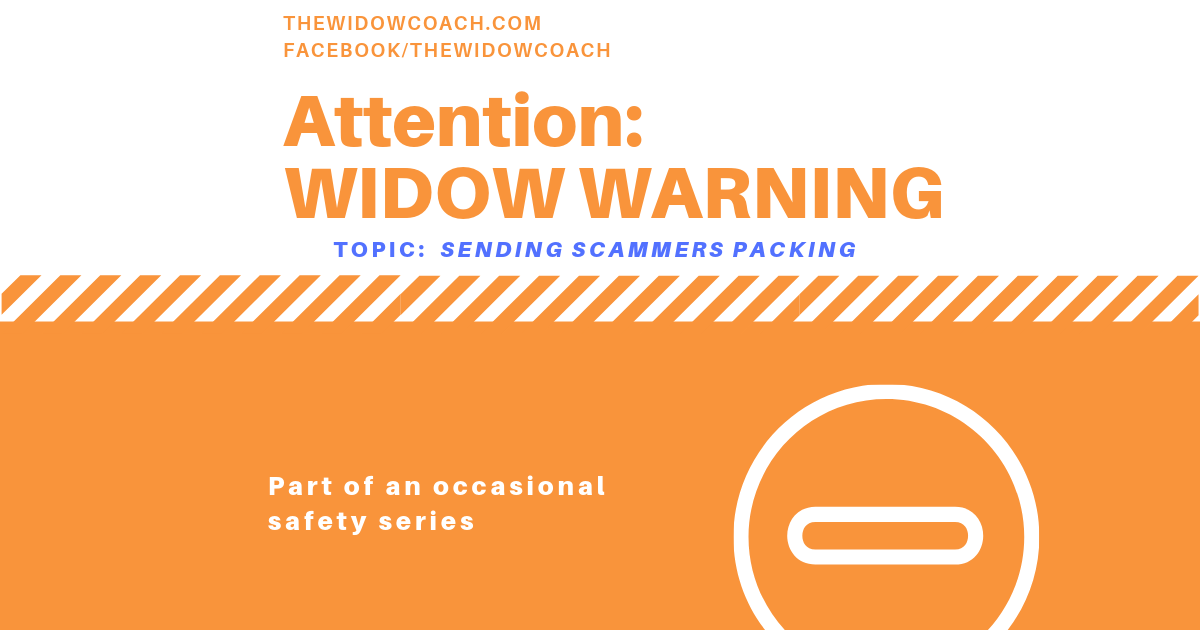
24 Apr Avoid Scammers!
This is the blog post I hate to write.
I hate it because it means that there are still criminals out there targeting widowed people, men and women, when we are dealing with our own losses. But these crooks are out there, so PLEASE read, comment and share this so we can all put them out of business together.
Most widowed people encounter a scammer when they start dating for sure, many of us much earlier.
It starts something like this: someone reaches out to you. They appear interested in you, sometimes via a dating site, sometimes via Facebook, LinkedIn or some other social connection.
Their profile can be read or a picture is emailed to you. They “appear” to have a connection of some sort, generally also widowed, and they chat back and forth. There appear to be some similarities in your background. Sometimes they send flowers, or gifts, for weeks or months.
Ultimately, one of a few scenarios happen:
- They begin to drop hints of vague unease to set you up for a pending crisis and ask you for money
- They tell you about some scheme that requires your money to invest in to get some future payoff
- They ruthlessly collect information in an attempt to steal your identity, the identity of your dead spouse or your children
- They may ask for favors (cashing a check, shipping a package)
And, like it or not, you are a tempting target as a widowed person.
According to the FBI (Check out this article at https://www.fbi.gov/…/pres…/
Remember this, even if they are widowed: Death does not discriminate-bad people get widowed too!
It’s about three things for these criminals: money (life insurance, inheritance, or fake credit applications), assistance (engaging you in helping them with money laundering by cashing checks or shipping stolen goods) and future targets (by creating legitimacy with your widowed friends, perhaps with a new identity if you out them.
So, what is a widowed person to do?
Get smart by educating yourself (all part of that “widow backbone” I talk about).
1 – Limit the information you share about your spouse or your situation with persons not known to you. Some people handle this by not publishing an obituary or limiting the information in the public obituary to bare facts, and then creating a more detailed obituary that is kept in the family for purposes of family history.
2 – Consider smart financial steps when facing widowhood and after you are widowed: put passwords on all of your accounts, consider using only your first initial on checks, monitor your financial situation carefully for unusual charges, place a freeze on your credit or get a credit monitoring service after you are widowed.
3 – Keep a reasonable level of “suspicion” about people who are not known to you who suddenly enter your orbit post-widowhood. Verify, let things develop slowly and put on the breaks. Trust comes later, after verification.
Here are some budding “relationship” or “friendship” warning signs:
-
- Parallel profiles or experiences when someone approaches you: They try to set themselves up as member of the “community” by saying they are also widowed, raising a child as a single parent, etc. But-and this is important-they cannot verify common experiences related to being widowed. Ask them questions and their story falls apart.
- With friends, super close super fast
- “Love” declarations too fast, too quickly. Soul mates on the first date, instant connection or talks about “instant love” or “meant to be”
- A “story” about where they live or what they do.
- Sends you a photograph that looks professional, from a magazine, or too good to be true
- Claims to be any of the following: from the US and working overseas, military attached to a UN peacekeeping mission, Red Cross or Peace Corp mission, working on an oil rig, pipeline or some other “profession” that puts them outside the U.S. They key is you can’t find them.
- Sets up plans to get together but has a “family emergency,” “tragedy” or other event that gets in the way.
- Appears to contact you only in the early morning or late evening (signal that they may not be in your time zone
- Asks for money, especially wire transfers, or favors like cashing checks for all sorts of reasons (travel, medical emergencies, family emergencies, stranded while travelling, hotel/hospital bills, help for child, help when victimized by a crime, terminal illness with promise of a bequest)
- Significantly younger or older than you.
- Wants you to JUMP OFF the dating site, social site super-fast and connect directly
- Their public profile states that they make a lot of money, or leaves that impression (they want you to think that you’ll be quickly reimbursed for any funds requests)
- Their online profiles don’t go back far enough. Think about it…how much information do YOU have online, even if it is at a privacy-conscious level. Their “backstory” is weak, or doesn’t add up
- They bring up religion right away and seem to use it as a way to “prove” their character initially.
- Often, if is a woman scammer targeting a man, she will try to use sex as a weapon initially-claiming to be from somewhere exotic, needing help to finish education and there is often an age differential between her and her target
- Photos may be good ones, but not specific or “right” for our culture here in the U.S….the pose may be off or the activity seems unfamiliar. Photos, like language, have a cultural context.
4 – Ask questions and listen to the response without calling them out. Do not allow yourself to fill in any gaps for them. Let them tell you about them. They are the predator and you are the prey in their minds-don’t bother giving them any information that you are suspicious. We all know there are common responses to being widowed, common experiences we all share. I am not going to detail them here because I won’t give the scammers that information, but their responses will be “off” in ways you can sense.
Here’s an example: at one point I was showing my teenage son how to spot a scammer on a popular dating site. The scammer claimed that he had lost his father at a young age-and my son picked up immediately that his reactions were not “right”
5 – NEVER SEND MONEY OR WIRE TRANSFER. NEVER CASH CHECKS. NEVER SHIP PACKAGES FOR SOMEONE UNKNOWN TO YOU.
6 – What to do when you are targeted (note, I say “when” not “if” because it can be a challenge to avoid this type of situation):
- Don’t send money or participate in the scam in any way
- Don’t tell them you are onto them.
- Report the account, the profile to the site administrators.
- Do NOT give this individual your email address, IM information or any other details that can personally identify you, such as your real name or where you work.
- Block the person from contacting you on the site
- Warn your friends if they were on a common social site with you
- Cease contact immediately, do not engage in messaging with them, and don’t look back
- If the person has already engaged in what could be criminal activity, gather all data on how to locate and identify them and report it to the proper authorities. Include details like their Instant Message address, twitter handle, Facebook profile, email account, phone number, skype address and other channels through which they’ve contacted you can help the right authorities track them down. Details matter-and it may not help you, but it may help a future prosecution.
Please if you are victim of a scam using the internet, please file a report with the FBI www.ic3.gov. Our law enforcement officials use this information to track scams and trends.
CONGRATULATE yourself for taking this step and kicking them out of your world. What they do has nothing to do with you and who you are. They are treating you just like they would an ATM and, fortunately, these scumbags are a minority when we look at the truly good people out there who help us when widowed. Remember, being targeted by a scammer (or more than one) has nothing to do with you-you don’t “attract” these types.
This is one step in your widowed journey to becoming a stronger, safer person. You can do it-I believe in you.
~The Widowcoach






No Comments